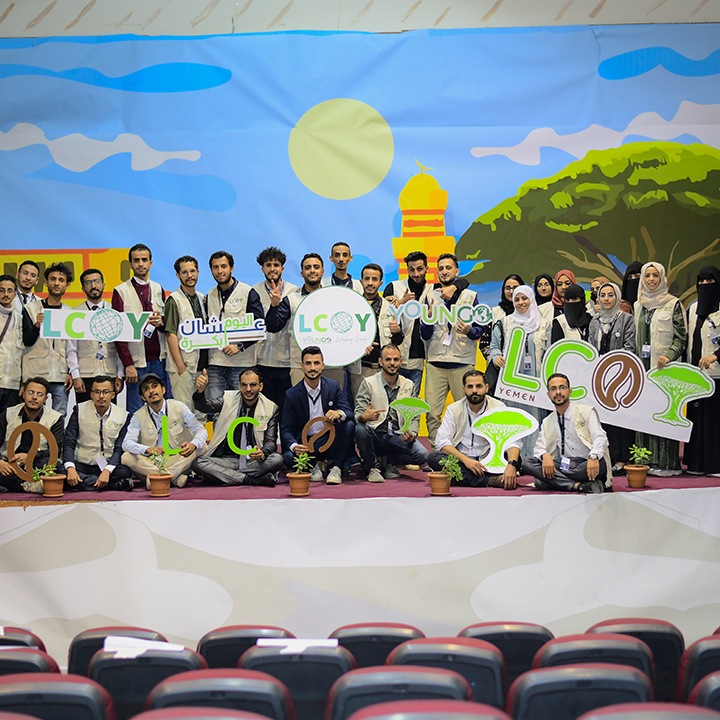Local Conference of Youth on Climate Change (LCOY 2023) - Sanaa
Local Conference of Youth on Climate Change LCOY Yemen successfully convened its first edition in the capital Sana'a from November 20 to 21, 2023. The conference aimed to bring together young people to discuss climate change issues and their crucial role in addressing them.
With a shared passion for environmental sustainability, 200 young men and women from across Hadramout engaged with 22 experts and speakers from diverse environmental and climate fields. Together, they delved into the complexities of climate change and the transformative power of youth leadership.
Over 70 dedicated volunteers meticulously organized the event, ensuring its resounding success. The conference featured an array of interactive activities, including:
7 thought-provoking panel discussions
6 hands-on workshops
A culminating plenary session showcasing youth recommendations
The conference's first session delved into climate action policies in Yemen, emphasizing the need for enhanced international cooperation to confront climate challenges in the country. Discussions centered on securing financial and technical support for climate projects, the role of youth and civil society organizations in advocating for climate-friendly policies, the importance of community involvement in formulating and implementing climate policies, and the crucial role of youth and civil society organizations in promoting climate-friendly policies.
The second session focused on youth participation and climate action advocacy. Key discussions revolved around policies governments can implement to encourage youth involvement in climate policymaking, such as establishing youth advisory councils and providing training opportunities. The session also highlighted the significance of collaboration between youth organizations and policymakers in formulating effective climate policies through participation in climate and environmental dialogues, consultations, and conferences.
The third session explored the role of media in climate communication. Speakers addressed the challenges faced by journalists in accurately representing climate-related information, such as a lack of knowledge and training. Discussions also focused on enhancing climate communication and environmental awareness efforts at the community level through awareness programs and participatory initiatives. Additionally, the session emphasized the importance of journalists adhering to ethical principles when reporting on climate change and the role of local communities in strengthening climate communication and environmental awareness efforts by sharing their experiences and knowledge and producing local media content.
The fourth session examined the drivers of desertification in Yemen, the role of local communities in combating it, and best practices for sustainable land management. The session shed light on the primary factors contributing to the worsening of desertification in Yemen, including drought, overgrazing, and deforestation. Discussions also covered best practices for sustainable land management that can be replicated in other regions. These practices include tree planting, land rehabilitation, and the adoption of water-efficient irrigation techniques.
Complementing the panel discussions, two workshops provided hands-on opportunities for youth engagement. The first workshop focused on the role of youth in the COP, the United Nations Climate Change Conference. Participants discussed the importance of youth participation in climate decision-making and how to amplify their voices to world leaders. The second workshop delved into climate adaptation strategies in Yemen. Participants explored the challenges facing Yemen, such as drought and water scarcity, and their impacts on agriculture, food security, and health.
The second day commenced with a session titled 'Resilience in Yemen - The Role of Youth," sparking a critical dialogue on the role of youth in enhancing community resilience to climate change. TThe session highlighted the initiatives of this program aimed at improving livelihoods and food security in rural areas, fostering climate-resistant infrastructure development, The discussion explored the role of NGOs and international agencies in supporting climate change adaptation efforts in Yemen,The third topic Exploring the concept of "green jobs" and their significance in promoting sustainable development and combating climate change, including an overview of job opportunities within this sector.
The second session addressed "Climate Resilience in Yemeni Agriculture." The session showcased successful agricultural practices and discussed how to implement climate-resilient agricultural practices to enhance crop resilience. Additionally, the session explored policy measures that support agricultural resilience in Yemen, such as providing support to farmers for adopting sustainable agricultural practices, investing in agricultural research and development, and developing climate-resilient agricultural infrastructure.
The third session tackled "Water Security in Yemen" by reviewing the current water situation in Yemen. Participants discussed innovative sustainable management solutions to address Yemen's water crisis, including water reuse and treatment, rainwater harvesting, and the adoption of water-efficient irrigation techniques. The session concluded by emphasizing the importance of clear policies and strategies to ensure water security in Yemen, such as developing national water resource management plans, raising awareness about the importance of water conservation, and implementing strict laws to prevent water wastage.
In addition to the panel discussions, the second day included interactive workshops. Working groups explored ways to promote sustainable agriculture and food security in Yemen, focusing on the role of youth in promoting renewable energy use in Yemen, exploring the challenges and opportunities in the field of renewable energy, the importance of youth participation in water resource management and conservation efforts in Yemen, and emphasizing the importance of empowering youth through capacity-building programs and providing opportunities to participate in water-related decision-making. The need to develop a climate-resilient rural road infrastructure in Yemen and the possible solutions to overcome it were also discussed.
